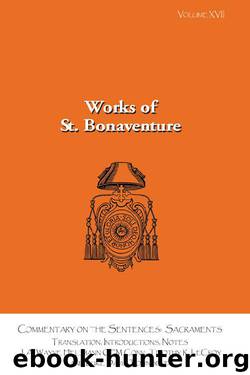Commentary on the Sentences: Sacraments (Works of st. Bonaventure) by Wayne Hellmann & Timothy LeCroy

Author:Wayne Hellmann & Timothy LeCroy [Hellmann, Wayne]
Language: eng
Format: epub
Publisher: Franciscan Inst Pubs
Published: 2016-01-31T16:00:00+00:00
IV SENT D. 11, P. 2, A. 1, Q. 3
QUESTION THREE
WHETHER WATER BELONGS TO THE INTEGRITY OF THE SACRAMENT OF THE EUCHARIST
The third question is whether water belongs to the integrity of the sacrament of the Eucharist. And that it is would appear:
1. Cyprian: “Just as in blessing the Lord’s cup water alone cannot be offered, so neither can wine alone.”66 Wine belongs to the integrity, and without it there can be no sacrament—therefore neither without water.
2. Again, it seems so from reason. This is because a sacrament of the body cannot happen with flour alone but only by the admixture of water does it become bread. Therefore neither can the sacrament of blood happen without the admixture of water.
3. Again, either the Lord imposed it or he did not. If he imposed it, then what he institutes belongs to the integrity of the sacrament, because anyone who acts otherwise accomplishes nothing; therefore, etc. If he did not impose it, it was presumptuous to require it.
4. Again, whatever signifies something which is of the substance, and prominently so, belongs to its substance of the sacrament. The commingling of water with wine signifies union with the head, as Bede says.67
5. Again, the wine stands for the blood which flowed from the side of Christ. Not only did blood flow, but rather blood and water.68 Therefore the sacrament is imperfect unless both are used.
But to the contrary: a. There is nothing that belongs materially to the substance of this sacrament that does not remain either in substance or in accidents. Since water is of this type, therefore, etc.
b. Again, any element that belongs to the substance of one sacrament does not belong to the substance of another, since they are distinct sacraments. However water is the element of Baptism; therefore it is not of necessity for this sacrament.
c. Again, everything that belongs to the substance is so with respect to its signification or to its efficacy. It is not with respect to its signification, because the true body of Christ and the Mystical Body must be signified. The blood is adequately signified by the wine, and likewise the union of the Mystical Body. Nor is it with respect to its efficacy because transubstantiation takes place without water.
Likewise whatever the case of integrity, I ask about congruity. And it would seem to be incongruous for water to be applied:
6. This sacrament concerns something that has the sweetness of every taste.69 Water is tasteless, therefore it is not fitting.
7. Again, nothing is added to the bread, therefore neither to the wine, or if something is added, the question is, Why?
8. Again, we do not read that the Lord used it. Therefore it would seem that the one who does not use it does not sin, but rather the one who uses it.
However that it is of necessity and congruous with the command, Cyprian writes, “It can absolutely not be unknown to us who have been advised that we offer the Lord’s chalice with wine mixed with water after the manner the Lord offered it.
Download
This site does not store any files on its server. We only index and link to content provided by other sites. Please contact the content providers to delete copyright contents if any and email us, we'll remove relevant links or contents immediately.
Periodization Training for Sports by Tudor Bompa(8272)
The Body: A Guide for Occupants by Bill Bryson(5096)
The MacArthur Bible Commentary by John MacArthur(4826)
The Sports Rules Book by Human Kinetics(4386)
What It Really Takes to Get Into Ivy League and Other Highly Selective Colleges by Hughes Chuck(3760)
Marijuana Grower's Handbook by Ed Rosenthal(3684)
The Sprouting Book by Ann Wigmore(3592)
The Martian by Andy Weir(3427)
Salt, Fat, Acid, Heat: Mastering the Elements of Good Cooking by Nosrat Samin(3147)
Harry Potter 4 - Harry Potter and The Goblet of Fire by J.K.Rowling(3073)
Sapiens and Homo Deus by Yuval Noah Harari(3071)
The Bread Bible by Rose Levy Beranbaum(3069)
The Marketing Plan Handbook: Develop Big-Picture Marketing Plans for Pennies on the Dollar by Robert W. Bly(3062)
Classic by Mary Berry(3014)
Martha Stewart's Baking Handbook by Martha Stewart(2860)
Screenplay: The Foundations of Screenwriting by Syd Field(2642)
The Plant Paradox by Dr. Steven R. Gundry M.D(2620)
50 Economics Classics by Tom Butler-Bowdon(2571)
The Cambridge Grammar Of The English Language by Rodney Huddleston Geoffrey K. Pullum(2430)
